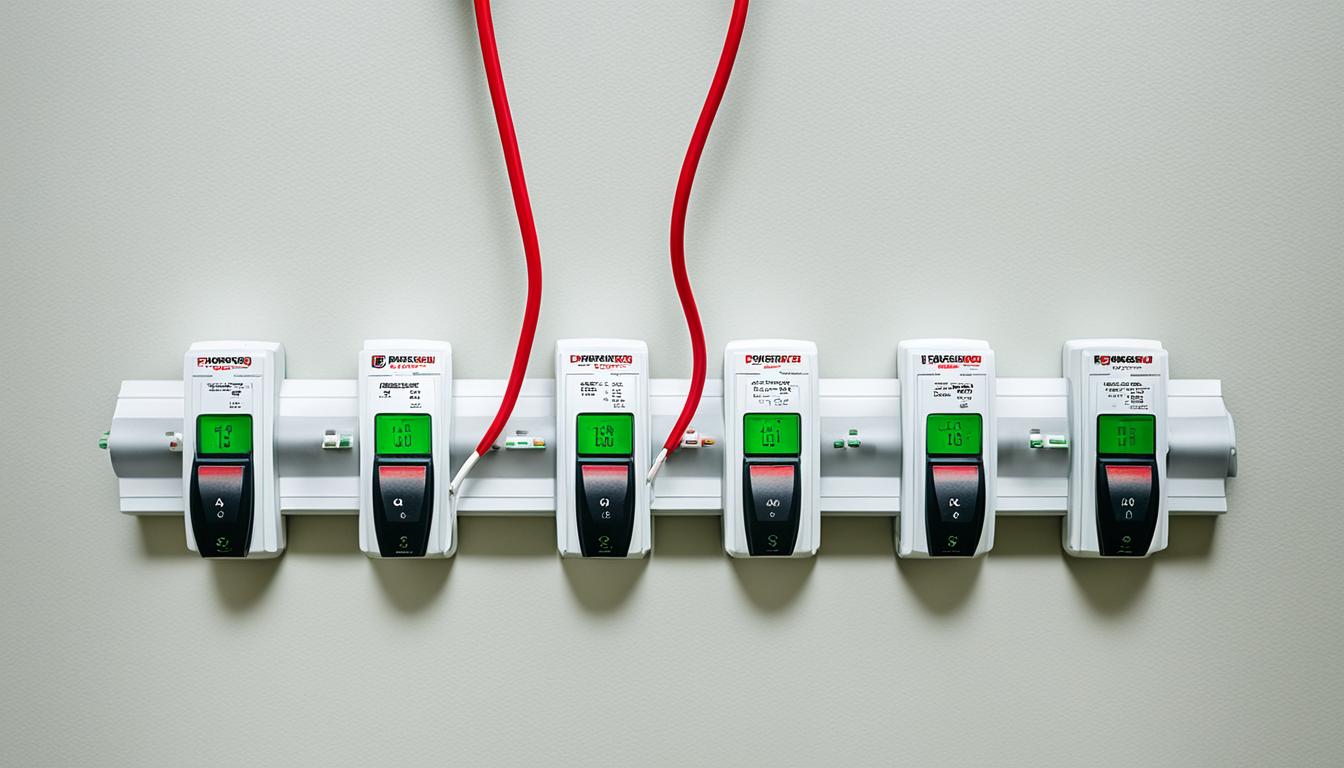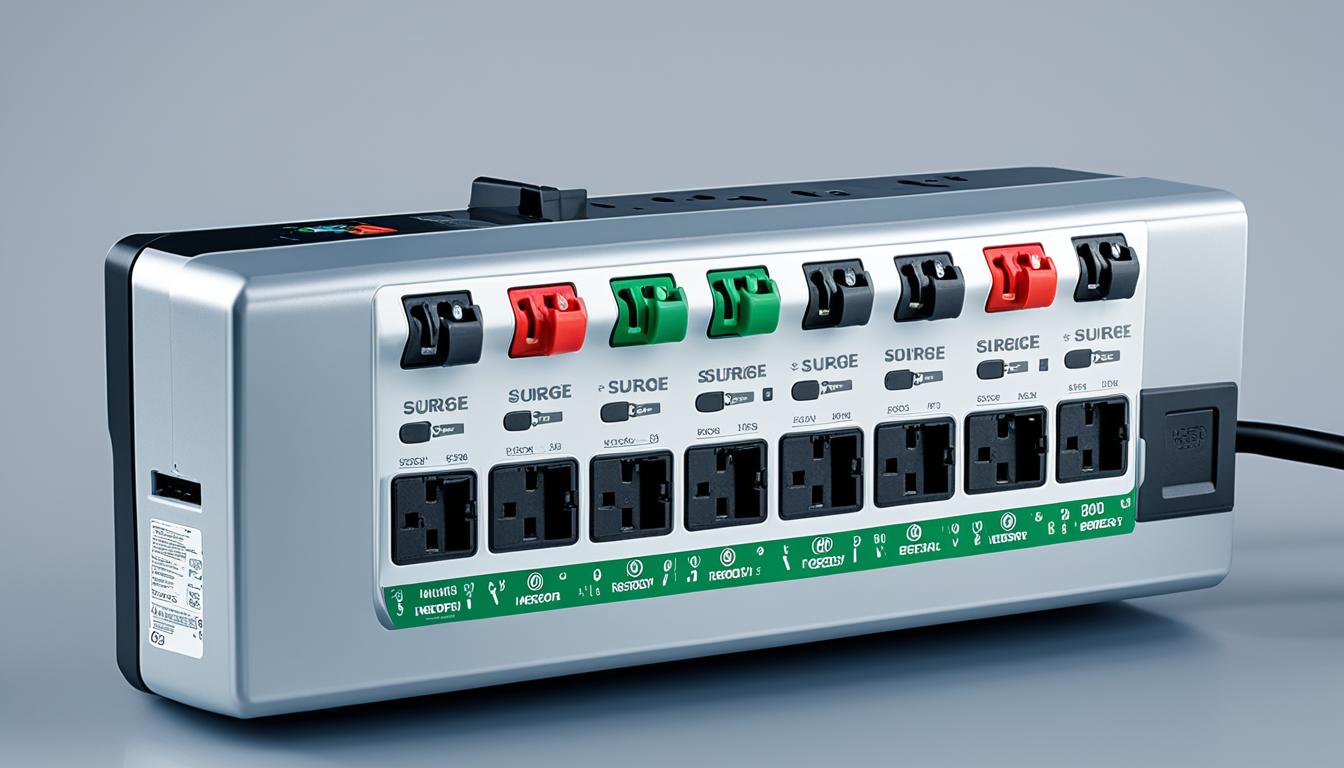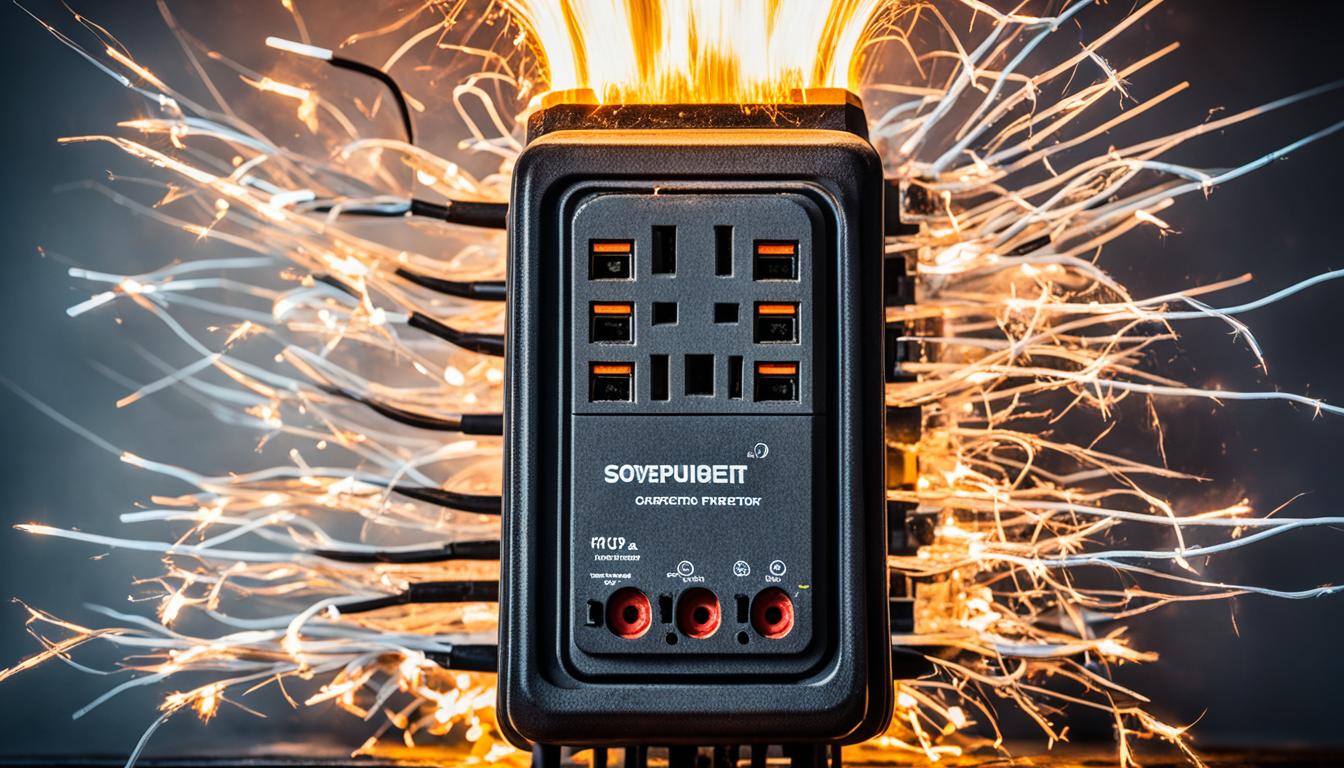Are you aware of the importance of surge protectors when it comes to safeguarding your appliances, especially your refrigerator? Power surges can pose a significant risk to the delicate electronic components of your fridge, potentially leading to damage or malfunctions. But with the help of a surge protector, you can ensure the longevity of your refrigerator and protect it from costly repairs or replacements caused by power surges.
Key Takeaways:
- Surge protectors are essential for protecting appliances like refrigerators from power surges.
- Refrigerators contain complex electronic components that are vulnerable to power surges.
- Evaluating your power supply and risk factors can help determine if your fridge needs a surge protector.
- Alternative methods like whole-house surge protection and isolation transformers can also protect your appliances.
- Understand the difference between power strips and surge protectors to make the right choice for your appliances.
The Importance of Surge Protection for Refrigerators
Refrigerators play a crucial role in keeping our food fresh and our drinks cold. However, many people fail to realize that these appliances are susceptible to power surges, which can cause significant damage. This is where surge protectors come in.
Refrigerators are equipped with complex electronic components such as control boards, sensors, and displays. These components are sensitive and can be easily damaged by sudden voltage spikes. Power surges can lead to malfunctions or even complete failure of your refrigerator, resulting in costly repairs or the need for a replacement.
Using surge protectors specifically designed for appliances, like refrigerators, is an effective way to protect them from power surges. These surge protectors offer higher joule ratings and are better equipped to handle the larger power loads that refrigerators require.
By installing a surge protector for your refrigerator, you can:
- Protect your fridge against voltage spikes
- Extend the lifespan of your refrigerator
- Safeguard the electronic systems within your fridge
Surge protectors act as a barrier, diverting excessive voltage away from your refrigerator and safely grounding it. They provide peace of mind, ensuring that your fridge remains safe and operational, even during electrical disturbances.
Investing in a surge protector for your refrigerator is a wise decision, as it can potentially save you from costly repairs or replacements caused by power surges. Don’t wait until it’s too late – take the necessary steps to protect your fridge and enjoy uninterrupted performance.
Quote:
“Surge protectors offer the peace of mind that your refrigerator is protected against power surges, safeguarding your investment.”
– Jane Anderson, Electrical Expert
Determining if Your Fridge Needs a Surge Protector
Evaluating your power supply and assessing your risk factors can help you determine if your refrigerator needs a surge protector. By considering a few electrical safety tips for refrigerators and following guidelines for plugging fridges into surge protectors, you can make an informed decision to protect your appliance.
If you live in an area prone to frequent power surges or if the value of your refrigerator outweighs the cost of a surge protector, it is advisable to invest in one. Power surges can occur due to lightning strikes, electrical storms, or power grid fluctuations, and they can potentially damage the sensitive electronic components of your fridge. With a surge protector, you can prevent such damage and ensure the longevity of your refrigerator.
Electrical Safety Tips for Refrigerators:
- Inspect your power outlets to ensure they are in good condition and properly grounded. Faulty outlets can increase the risk of power surges.
- Avoid overloading the circuit by plugging multiple appliances into the same outlet. This can contribute to power surges.
- Consider the age and condition of your refrigerator. Older appliances may be more susceptible to power surges.
Guidelines for Plugging Fridges Into Surge Protectors:
- Choose a surge protector specifically designed for appliances or refrigerators. These surge protectors have higher joule ratings and are better equipped to handle the power load of large appliances.
- Read the manufacturer’s guidelines and instructions for proper installation and usage of the surge protector.
- Ensure that the surge protector has a clamping voltage that is low enough to provide effective protection for your refrigerator.
- Regularly check the surge protector for any signs of wear or damage, and replace it if necessary.
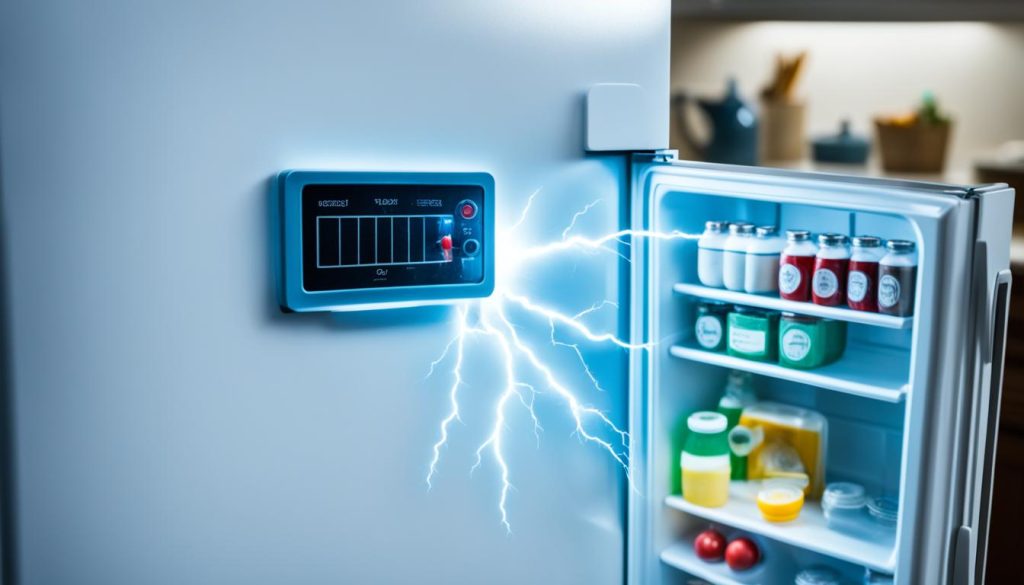
Investing in a surge protector for your refrigerator provides peace of mind, knowing that your appliance is protected against potential damage and expensive repairs or replacements caused by power surges. By following the mentioned electrical safety tips and guidelines, you can ensure the safety of your fridge and extend its lifespan.
Other Methods to Protect Your Appliances
In addition to surge protectors, there are alternative methods to protect your appliances from power surges. These methods provide additional layers of defense, ensuring the safety and longevity of your valuable appliances.
Whole-House Surge Protection
One effective method is installing a whole-house surge protection system at your electrical panel. This comprehensive solution safeguards all the appliances in your home, including your refrigerator. By intercepting power surges at the main electrical panel, the whole-house surge protection system prevents excessive voltage from reaching individual appliances.
With whole-house surge protection, you can have peace of mind knowing that every device in your home is shielded from potentially damaging power surges.
Isolation Transformers
Isolation transformers provide another layer of protection against power surges. These transformers create electrical isolation between the main power supply and your appliances. By isolating individual devices from the primary power source, isolation transformers help mitigate the impact of power surges, safeguarding your appliances and their sensitive electronic components.
Consider using isolation transformers for appliances that require an extra level of protection, such as refrigerators and other large appliances with intricate electronic systems.
Unplugging Appliances During Storms
A simple yet effective method to protect your appliances during storms and anticipated power surges is to unplug them. When severe weather conditions are expected, unplugging your appliances, including your refrigerator, can prevent damage caused by power surges. By disconnecting them from the power source, you eliminate the risk of voltage spikes reaching your appliances, ensuring their safety.
While this method may require additional effort, it provides a reliable way to shield your appliances from the unpredictable nature of storms.
Remember, when it comes to safeguarding your appliances, you have options beyond surge protectors. Explore these alternative methods and choose the ones that best align with your needs and preferences.
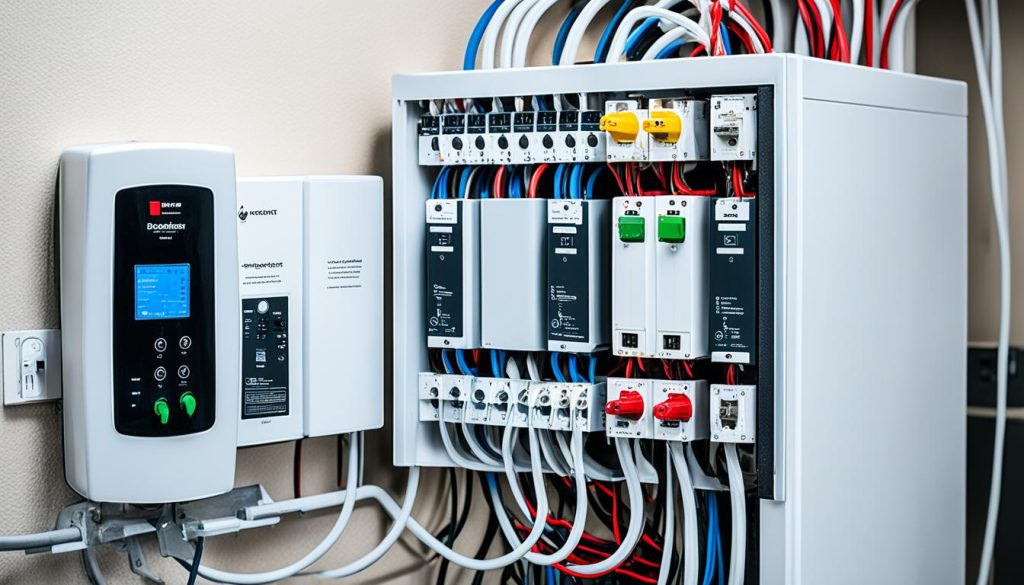
Understanding Power Surges and Surge Protectors
Power surges and power spikes are electrical events that can pose a threat to your appliances and electronic devices. It’s important to have a clear understanding of what they are and how surge protectors can help safeguard your valuables. Let’s take a closer look.
What is a Power Surge?
A power surge is a sudden, temporary increase in voltage that exceeds the standard level of electricity flowing through your home’s electrical system. These surges can occur due to various reasons, such as lightning strikes, electrical grid switching, or even faulty wiring in your home. The excess voltage generated during a power surge can overwhelm and damage electronic equipment, including appliances, computers, and entertainment systems.
Power Surge vs Power Spike
While power surges involve temporary increases in voltage, power spikes are shorter, more intense surges that can cause even greater damage. Power spikes usually last for less than a millisecond but can deliver a significantly higher surge of electricity. Both power surges and power spikes have the potential to harm your appliances and electronics if they are not adequately protected.
How Do Surge Protectors Work?
Surge protectors are designed to detect and divert excess voltage away from your appliances and electronics, preventing them from being damaged by power surges or spikes. They work by utilizing a metal oxide varistor (MOV) or a gas discharge tube (GDT) to redirect the excess electrical energy to a grounding wire or a surge protection device’s internal components.
“Surge protectors act as a shield between your appliances and the electrical grid, absorbing and redirecting harmful power surges.”
When a power surge occurs, the surge protector automatically diverts the excess voltage away from your devices, keeping them safe from potential damage. Some surge protectors also incorporate features like automatic shutdown or indicator lights to notify you if the surge protection has been compromised and requires replacement.
It’s important to note that surge protectors have a limited lifespan, and their ability to protect against power surges diminishes over time. Therefore, it is recommended to replace surge protectors periodically to ensure optimal protection for your appliances and electronics.
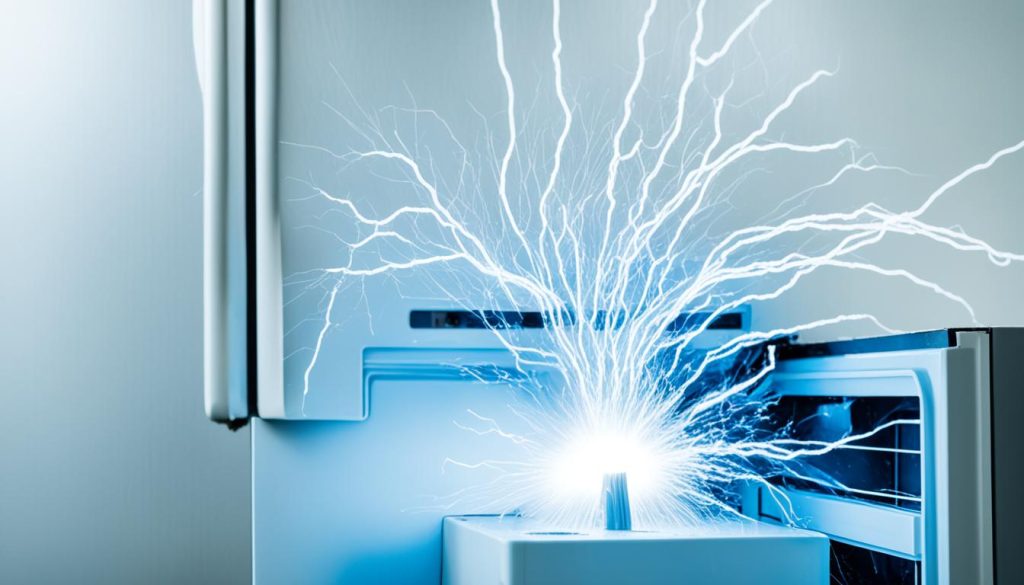
| Surge Protector Features | Benefits |
|---|---|
| High Joule Rating | Provides better protection against larger power surges. |
| Clamping Voltage | Determines the maximum voltage that the surge protector will allow to pass through to your devices. |
| Indicator Lights | Alerts you when the surge protector needs to be replaced or if it’s no longer providing adequate protection. |
| Automatic Shutdown | Cuts off power to connected devices if the surge protector detects a power surge that exceeds its capacity. |
Surge Protectors vs Power Strips
Power strips and surge protectors are often confused, but they serve different purposes. Power strips are devices that simply allow multiple devices to use power from one outlet. They provide additional outlets but do not offer any protection against power surges or spikes.
On the other hand, surge protectors offer the same functionality as power strips, allowing multiple devices to be plugged into a single outlet, but they also provide an added layer of protection. Surge protectors are designed to safeguard your appliances and electronics from power spikes and surges, which can potentially damage or destroy them.
When choosing a surge protector, there are a few key factors to consider. The joule rating indicates how much energy the surge protector can absorb before it needs to be replaced. A higher joule rating means better protection. The clamping voltage is the level at which the surge protector activates and diverts excess voltage. Lower clamping voltage is ideal for better protection. Additionally, it’s important to adhere to the installation guidelines provided with the surge protector to ensure optimum performance.
In summary, while power strips are useful for expanding the number of outlets available, surge protectors offer the added benefit of protecting your appliances and electronics from power surges and spikes. By investing in a surge protector with the right joule rating and clamping voltage, you can provide an extra layer of safety and ensure the longevity of your valuable devices.
FAQ
Can I plug a fridge into a surge protector?
Yes, you can plug a fridge into a surge protector. Using a surge protector can provide the necessary protection against power surges and safeguard your refrigerator’s electronic components.
Why is surge protection important for refrigerators?
Surge protection is important for refrigerators because power surges can damage or cause malfunctions in the electronic systems of your fridge. Surge protectors divert excessive voltage away from the refrigerator, protecting it from potential damage and expensive repairs.
How can I determine if my fridge needs a surge protector?
You can determine if your fridge needs a surge protector by evaluating your power supply and assessing your risk factors. If you live in an area prone to power surges or if the value of your refrigerator justifies the cost of a surge protector, it is advisable to invest in one.
What are some other methods to protect my appliances?
In addition to surge protectors, you can protect your appliances by installing a whole-house surge protection system, using isolation transformers, or simply unplugging appliances during severe storms or anticipated power surges.
What are power surges and how do surge protectors work?
Power surges are sudden increases in voltage that can damage electrical equipment. Surge protectors absorb and redirect excess voltage, preventing it from reaching appliances. They draw in extra voltage and safely divert the energy to a ground wire.
What is the difference between surge protectors and power strips?
Power strips allow multiple devices to use power from one outlet, while surge protectors offer the same functionality while also protecting appliances from power spikes and surges. When choosing a surge protector, consider the joule rating, clamping voltage, and installation guidelines for effective protection.
